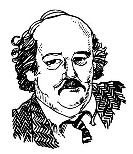(Syndicated to Kansas newspapers Nov. 18, 2013)
 What could be nicer than the governor’s plan to spend $9 million of Kansas’ $48 million in surplus federal Temporary Assistance for Needy Family (TANF) money on a statewide program to boost reading skills for Kansas children in specifically non-school programs?
What could be nicer than the governor’s plan to spend $9 million of Kansas’ $48 million in surplus federal Temporary Assistance for Needy Family (TANF) money on a statewide program to boost reading skills for Kansas children in specifically non-school programs?
Well, this being the Statehouse, where virtually nothing is just “nice,” already this new idea is being dissected. That’s what happens in the Statehouse.
The idea is aimed, though relatively loosely, at children who qualify for free or reduced price lunches under federal programs where the feds pay for those free school lunches.
That’s the target, poor kids who statistically aren’t generally reading at their grade level. Say, a third grader who reads like a first-grader. Those kids need help, of course, and Gov. Sam Brownback realizes it and sees the TANF money as a fund from which to contract with nonprofit organizations to teach after-school sessions for those kids through non-school programs.
You gotta wonder why the state has some $48 million in TANF funds just lying around, but that’s just one of those issues that grows from the program. Figure some legislators are going to be wondering how they can get their hands on that $48 million for other uses. Maybe more aid to the poor…but don’t count on it. They’ll get inventive… maybe using the money for meals for unemployed prison inmates?
The actual after-school program? Probably a little play time, a snack and someone helping the kids read. Not necessarily an accredited teacher, but some staffer, probably paid, who finds something to interest the children and get them reading in a non-classroom facility.
It’ll undoubtedly work. Figure many of the kids who will use this program aren’t going home to read with their parents, or there aren’t a lot of books around their homes, anyhow, and the less formal after-school program provides a second try at improving their reading skills in a fun, not academic atmosphere.
This goes another way. If a classroom teacher has, say, five kids in a formal in-school class who aren’t reading as well as they should, the teacher probably spends more time on the slow-readers, and the proficient readers in the classroom get less important teacher time.
But, if testing after a year of the program shows notable improvement in those reading skills, which it probably will…we’re figuring that there are legislators who will decide, do we really need to spend as much as we do on K-12 education? Do teachers need to be certified and get job-protecting tenure…which flows into should automatic payroll deductions for teacher union dues be allowed?
The better this program works—and if it improves reading skills which are a key to better learning overall and later on, better chances for getting a jobs and paying taxes and such—the more some lawmakers are going to look for ways to reduce conventional school funding…
Nice idea, one the Legislature can’t trip at the starting line as it did when it shot down Brownback’s “read at third-grade level or don’t go to fourth grade.” But there are other agendas likely to be spinning outside the governor’s office.
Count on it…
